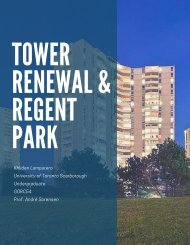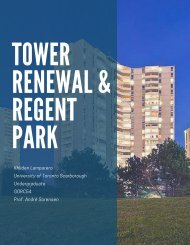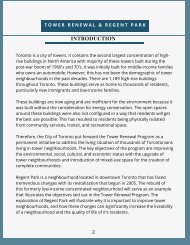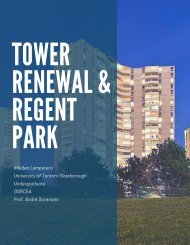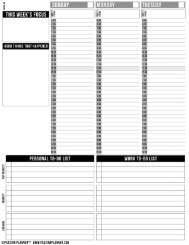merged2
Create successful ePaper yourself
Turn your PDF publications into a flip-book with our unique Google optimized e-Paper software.
Social and Cultural: increased social and cultural benefits and<br />
stronger communities<br />
One of the biggest disadvantage residents in tower neighbourhoods experience is not<br />
something within their apartment buildings, but outside of it. This is accessibility.<br />
There are 2 types of accessibility issues in Toronto's tower neighbourhoods:<br />
1. Lack of accessible amenities and community services, such as childcare, grocery<br />
stores, greenspace, doctor's offices, restaurants, retail shops, etc.<br />
2. Compromised accessibility to transit. The current design of tower neighbourhoods<br />
limit people's mobility. It is surrounded by parking lots, fences that block shortcuts,<br />
sidewalks that suddenly end, and long indirect walkways that are often unpaved and<br />
turn muddy during rainy days.<br />
it is not surprising that accessibility to services is an issue in tower neighbourhoods.<br />
This is because most of the tower neighbourhoods are located in the City's 13 priority<br />
neighbourhoods. These neighbourhoods have been identified as being underserved<br />
by the City's services and amenities. The lack of accessibility to these services have<br />
significant implications to people's quality of life.<br />
According to the City's apartment neighbourhood zoning bylaw, only dwelling is<br />
allowed in tower neighbourhoods, and all other land use is deemed illegal. This<br />
includes drug stores, bank, clothing stores, coffee shops, place of worship, and etc.<br />
Fortunately, Tower Renewal has a key initiative that directly solves the issue of<br />
accessibility. This is done through the implementation of mixed-land use within tower<br />
neighbourhoods, called the Residential Apartment Commercial (RAC) zoning. This will be<br />
further discussed under the Tower Renewal: Implementation Programs section. But<br />
this zoning bylaw is key to the creation of complete communities.<br />
Economic: improved local economy activity<br />
Tower Renewal retrofitting projects will have important economic implications with<br />
the creation of significant number of jobs in the construction and building industry. It<br />
will also foster development of local businesses with the implementation of RAC<br />
zoning, which will permit a number of small scale commercial and community uses on<br />
apartment building sites. This also means that residents, particularly single parents,<br />
can have the option of acquiring employment near their place of dwelling, and will not<br />
have to travel far distances and spend so much time in transit. Instead, they will have<br />
more opportunities to be with their family. The improvement in local economic<br />
activity will contribute to the vibrancy of tower neighbourhoods, and the increased<br />
quality of life of its residents.<br />
4



